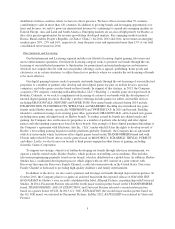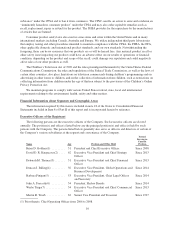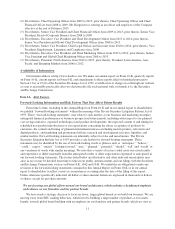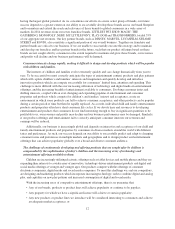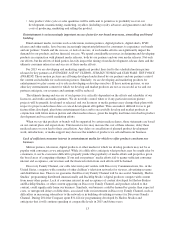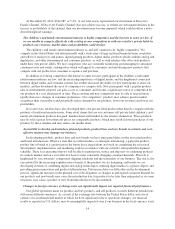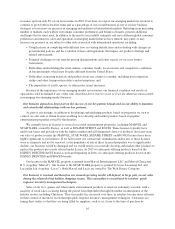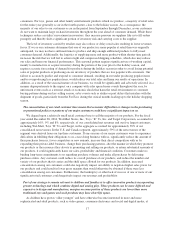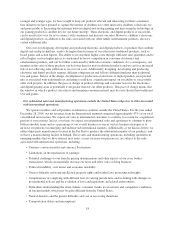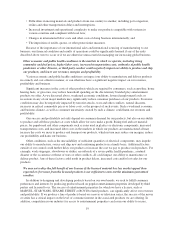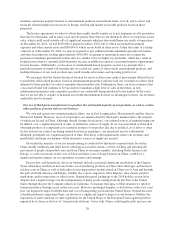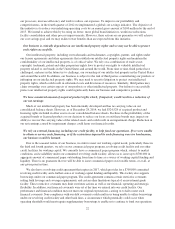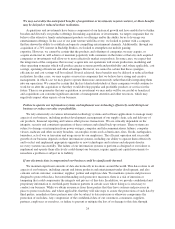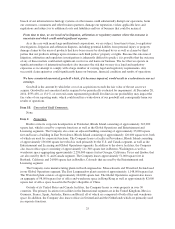Hasbro 2014 Annual Report Download - page 29
Download and view the complete annual report
Please find page 29 of the 2014 Hasbro annual report below. You can navigate through the pages in the report by either clicking on the pages listed below, or by using the keyword search tool below to find specific information within the annual report.significantly affected. As an example, if the dollar appreciates 10% relative to a local currency for an
international market in which we had $200 million of net revenues, the dollar value of those sales, as they are
translated into U.S. dollars, would decrease by $20 million in our consolidated financial results. As such, we
would recognize a $20 million decrease in our net revenues, even if the actual level of sales in the foreign market
had not changed. Similarly, our expenses can be significantly impacted, in U.S. dollar terms, by exchange rates,
meaning the profitability of our business in U.S. dollar terms can be negatively impacted by exchange rate
movements which we do not control. Late in 2014 certain key currencies, such as the Euro, Russian Ruble, and
Brazilian Real depreciated significantly compared to the U.S. dollar. This depreciation had a significant negative
impact on our 2014 revenues and earnings. Similar depreciation in key currencies during 2015 may have a
significant negative impact on our revenues and earnings as they are reported in U.S. dollars.
United States, global and regional economic downturns that negatively impact the retail and credit markets,
or that otherwise damage the financial health of our retail customers and consumers, can harm our
business and financial performance.
We design, manufacture and market a wide variety of entertainment and consumer products worldwide
through sales to our retail customers and directly to consumers. Our financial performance is impacted by the
level of discretionary consumer spending in the markets in which we operate. Recessions, credit crises and other
economic downturns, or disruptions in credit markets, in the United States and in other markets in which our
products are marketed and sold can result in lower levels of economic activity, lower employment levels, less
consumer disposable income, and lower consumer confidence. Similarly, reductions in the value of key assets
held by consumers, such as their homes or stock market investments, can lower consumer confidence and
consumer spending power. Any of these factors can reduce the amount which consumers spend on the purchase
of our products. This in turn can reduce our revenues and harm our financial performance and profitability.
In addition to experiencing potentially lower revenues from our products during times of economic
difficulty, in an effort to maintain sales during such times we may need to reduce the price of our products,
increase our promotional spending and/or sales allowances, or take other steps to encourage retailer and
consumer purchase of our products. Those steps may lower our net revenues or increase our costs, thereby
decreasing our operating margins and lowering our profitability.
Challenging market conditions in certain developed economies, such as in the United States, Canada,
Australia and certain Western European countries, make it more difficult for us to succeed.
Our future success in the United States, Canada, Australia, Europe and other developed economies is
impacted by market conditions. For example, a European sovereign debt crisis or other significant negative shock
to European markets could lead to a recession in Europe, which may negatively impact consumers and in turn,
sales of our products in the European markets. Similar negative events impacting the market in the United States
and other developed economies may harm our business.
Many categories within the toy, game and family entertainment industries in the United States, Canada,
Australia, certain Western European countries and other developed economies have not grown, or in some cases
have even declined, in recent years. In addition, many current economic predictions suggest developed
economies may grow only modestly, if at all, in the next several years. We have substantial business in
developed economies, and these markets represent a majority of our current product sales. It is more difficult for
us to grow, or even maintain, our business when the overall market in certain of the major countries we serve is
not growing or is declining. To succeed in a market that is stable or declining, we must maintain or gain market
share from our competitors, which is more difficult than growing in an expanding market. As long as economic
conditions in the developed economies remain difficult, this will be an additional challenge for the Company.
An increasing portion of our business is expected to come from emerging markets, and growing business in
emerging markets presents additional challenges.
We expect an increasing portion of our net revenues to come from emerging markets, including Eastern
Europe, Latin America and Asia. In 2014 revenues in emerging markets constituted approximately 16% of our net
15


